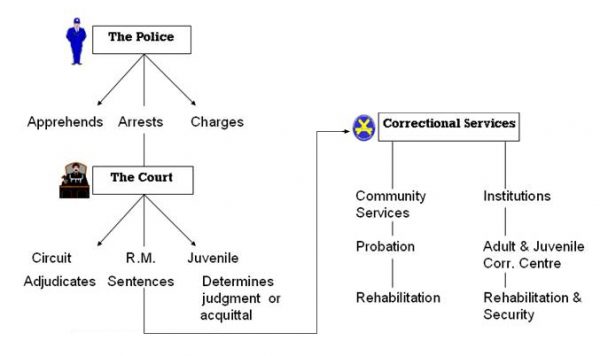
The Criminal Justice System is basically a legal system. Underlying its foundation is the Criminal Law, which is concerned with people’s conduct. Its purpose is to regulate behaviour and maintain Order in Society.A Scenario:
21 year old Tom Jones works at Myca’s Service Station. One day he had a quarrel with a customer Roy Reid. During their disagreement Tom used the gas nozzle to hit Roy, causing a would to his head. The matter was reported to the POLICE. Tom was later arrested and charged with the offence of Unlawful Wounding.
Tom appeared before the COURT. The matter was tried and Tom was found guilty. Before handing down sentence, the Judge requested that the PROBATION SERVICES investigate and prepare a Social Enquiry Report in respect of the offender.
In carrying out the investigations the Probation Officer interviewed Mr. Jones, visited his home, place of employment and his community where important information was gathered on him.
The report was collated and presented to the COURT. This report assisted the Judge in determining sentencing. He gave Mr. Jones a PROBATION ORDER for the duration of three (3) years. During this period Mr. Jones will receive counselling and guidance, geared towards behaviour modification on a one-to-one basis. This process is called casework supervision and will be facilitated by a Probation After-Care Officer.
Some areas of concentration during supervision may include:
- Behaviour Modification
- Conflict Resolution
- Anger Management
- Self-Respect and respect for others
- Building positive self image and self esteem
- Setting goals that are attainable
- Promoting personal growth and development
- Offending Behaviour and how to avoid re-offending
Other useful Information:
Probation Officers are trained professionals, experienced and efficient. They are persons you can approach and in whom you can confide.

